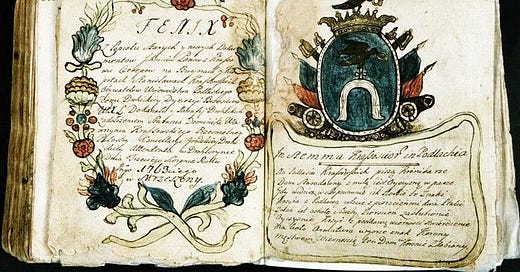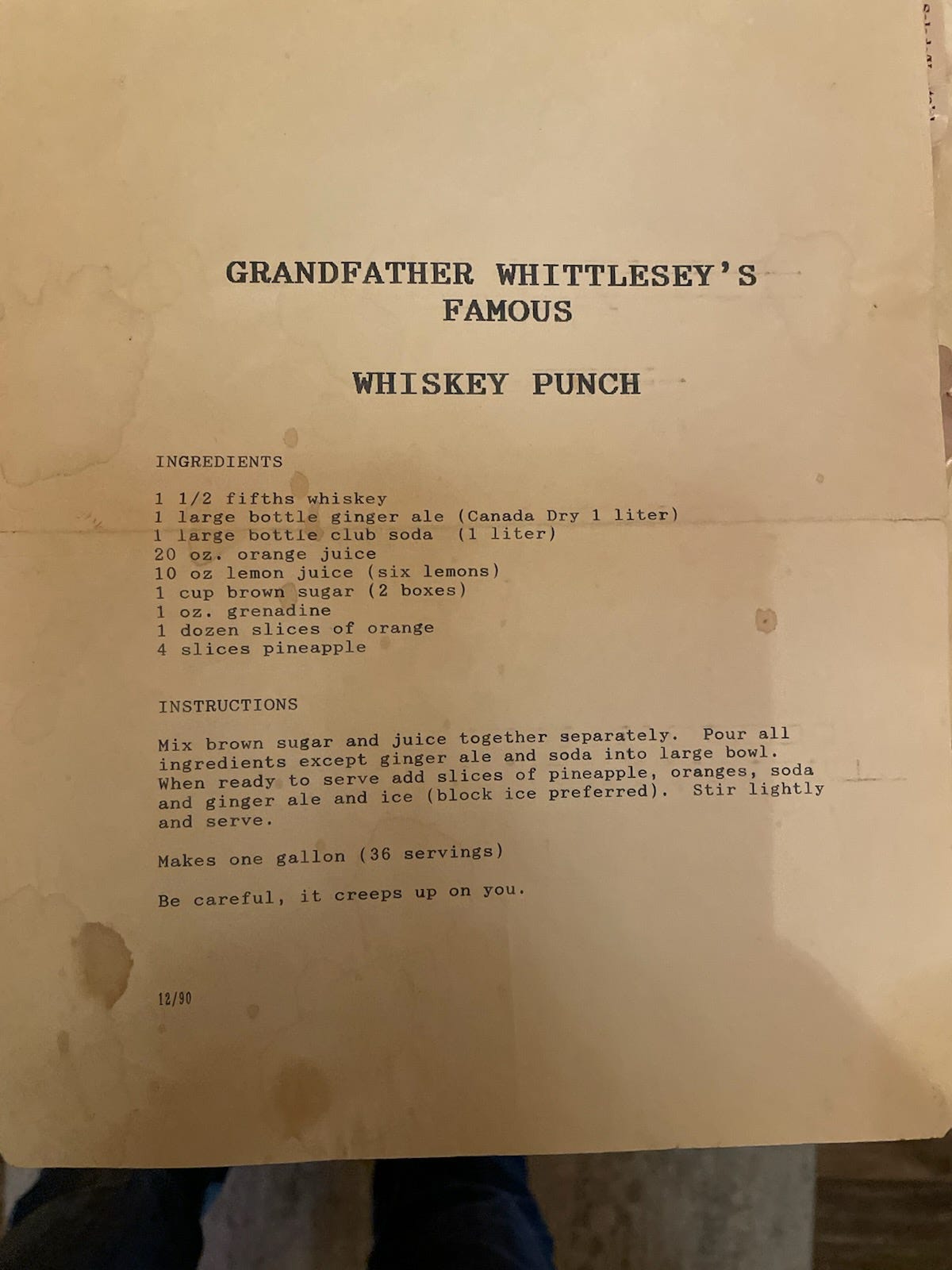From the apothecary
I’m hosting our annual “friend” Christmas party this weekend. It will only be ten people, we wouldn’t be able to squeeze anymore into our house comfortably. But it’s cozy and it feels special to be able to do the same tradition year after year. Especially living under the shade of cheap capitalism where everything is manufactured to break. Nothing lasts as long as it used to. My grandma has a waffle maker that she’s had for about six decades. It still makes the best waffles I’ve ever had. (Thanks Nana if you’re reading this!)
I decided to lean into tradition last year and make Polish food for the party. I started with pierogis, kielbasa, and kapusta. Growing up, we always had pierogis at Christmas. When my other grandmother passed, we simply stopped. I was too young then to notice the significance of that. How easily traditions die away, how we barely notice it at all.
This year, I wanted to tie in something from my waffle-making side of the family. I learned just a few years ago that there is a family recipe that goes back to my great great grandfather. By some miracle, it was actually typed onto paper. It is a punch recipe. It’s simple, with no real cultural ties at first glance.
Yet, it feels precious. It makes me wonder what made it “famous”. I marvel at the amount of sugar from the combined ingredients. Be careful, it creeps up on you. That part is my favorite. Whether it was added by whoever typed this or my great great grandfather himself, it feels like there is still a voice somewhere in this yellowing stained piece of paper.
It reminds me that our cultural identities aren’t just where we come from, but where we are. My great great grandfather was born in Detroit. The same place my family has lived for generations. The city has its own culture, as well as Michigan, the Midwest, the US as a whole. There are so many layers of identity woven into us.
Those of us who are a part of some diaspora are longing for connection to those who came before us, to the culture they were a part of. But maybe we don’t have to look so far. There are breadcrumbs everywhere; voices in pieces of paper, photographs, word of mouth. There are paths to connection inside our current culture, as hard as it is to look at sometimes. This too is part of our identity, ginger ale, club soda, grenadine, and all.
In the 16th through the 18th centuries, Polish families kept records called silva rerum, or sylwa in Polish. This translates to “forest of things”. It was a group of writings that contained the story of a family. Traditions, notable events, gossip, philosophical musings, legal documents, jokes, recipes, advice, and really anything they wanted future generations to know filled the pages. Each generation would add to this memoir. Some ended up being thousands of pages long.
This “forest of things” became its own ecosystem. As each generation of words was pushed further and further back into the records, new ideas and thoughts sprouted from their decay. But like the rich soil of the forest floor, these older words were just as important as the newer ones. They provided nutrients and guidance for those to come, a solid base from which the woodland could continue on into its old growth stage.
Yet today, it feels like we clear cut our own family lineages with each generation. So much is lost. When my Polish family also moved to Detroit, my grand uncle told my great grandfather he had to stop speaking Polish so that he would fit in. My great grandfather would have none of it, but the generation after quickly slipped the hard consonants and rolling pronunciations into the attic. That’s when our language died.
But what if we start adding amendments back into our forests. We can sprinkle the tidbits of information we do have back onto the ground. We can be the beginning of something old.
Just by writing things down, as trivial as they may seem, we can create a source of connection for our family yet to come. Cook the traditional foods. Read the folk stories. Feel the return of those who’ve left.
So this year, while I make my pierogis, I’ll also brew up this punch. I might have to balance out the sugar a bit, but that’s a note I can add myself. A contribution of my own to add to our family forest.
From the forest
I live in the forest, but I also live in a swamp. It is what ecologists call a flooded forest. Every spring the snow and high water table create vernal pools all over the forest. It also brings hordes of mosquitoes, but I try to block that part out. By late summer they dry up again, leaving lush grasses and water loving plants in their wake.
Michigan is a land of water, as contradictory as that sounds. Aside from these marshy forestlands, there are streams and rivers that crisscross the landscape, tiny ponds, sizable lakes, and of course the Great Lakes. In the summer we immerse ourselves in it. In winter we ice fish, skate and ski on it. Water is life.
It’s been a sad week for many of us. The Michigan Public Service Commission has granted Enbridge (a Canadian oil company) permission to replace the existing Line 5 dual oil pipelines in the Straits of Mackinac between Lake Michigan and Lake Huron with an untested underground pipeline tunnel. The current pipeline is 70 years old, already a danger to one of the most delicate ecosystems.
The Great Lakes holds 84% of the entire country’s surface freshwater. An oil spill in a place like this would be catastrophic. While it hasn’t leaked in the lakes yet, there are 29 known spills, ruptures and equipment failures along Line 5 that have released more than 1 million gallons of oil and natural gas liquids since 1968. The pipeline also violates the treaty rights of the native people of the area, people who have been at the forefront of this fight against Enbridge.
President of the Bay Mills Indian community stated:
“Instead of complying with a Governor’s public safety order to decommission Line 5 in Michigan, individuals working at a state agency granted Enbridge a permit for a project for which they hold no property rights and no safety track record in good standing. Today’s decision is another notch in a long history of ignoring the rights of Tribal Nations. We must act now to protect the peoples of the Great Lakes from an oil spill, to lead our communities out of the fossil fuel era, and to preserve the shared lands and waters in Michigan for all of us.”
This decision comes amidst the state’s vows to become carbon neutral. We are at a critical point in determining the future of our energy resources, and it seems we are taking a step back.
The issue is that the Michigan Public Service Commission says we have no current feasible alternatives for the pipeline. We say we want to go carbon neutral, but no one seems to be offering solutions of how we can actually do that for issues as large as this.
Water protectors will continue to fight for these places that have no voice. We are in it for the long game. Whether it’s in ten years or one hundred, eventually there will be no other option. Cherish your water.
Much love,
Val
If you want to move deeper into a seasonal land-based life, consider pre-ordering my 2024 edition of the Lunica Planner. Because learning to live in tune with the land doesn’t come from grand gestures or life-altering shifts, but rather from daily routines, devotions and observations of the land and how we relate to it.
This yearly planner is the love child between a farmer’s almanac and your daily lunar planner. It weaves seasonal land-based practices with modern living so that you can live more intentionally and presently within every season of your life. It was created for the plant people, the land lovers, the gardeners, and the seekers to plan their lives around the rhythms of the earth as our ancestors have for thousands of years. More than just a planner, Lunica is a practical yet spiritual guide to living, working, gardening, and celebrating in tune with the ever-shifting world around us.
Purchasing a planner also helps support this publication!
Share this post with your plant friends!
And if you’re not already subscribed to The Medicine Garden, sign up to receive more plant love directly to your inbox. No spam, just an herbalist and gardener sharing her stories.







Love this little "forest of things". I too have been on the journey of bringing to the surface many traditions that have been forgotten from my heritage, partly through modernism and partly through the life of an immigrant family. It is indeed weaving threads of the old into the new. Honouring what was with what is now. I feel inspired by this catalogue of generational remembrance. If I started it now, oh what kind of things will be born in its pages generations from now. Thank you for that. And for this awareness about the pipelines in Michigan. My partner and I were recently exploring Michigan. The lakes there are absolutely magnificent. A living breath. It is a big thing to protect such important, massive, foundational ecosystems. Thanks for that work too <3 May the waters run free, pure and wild, as they are meant to. With love, Marija.
Interesting that grandfather chose Canada Dry over the local, older, ginger ale Vernor's of Detroit. Maybe because Canada Dry is less sweet and balanced the sugàr.
Something similar can be made with rum.
I've been writing a recipe collection for my grandson's inheritance since he began preserving and cooking with me as a toddler.